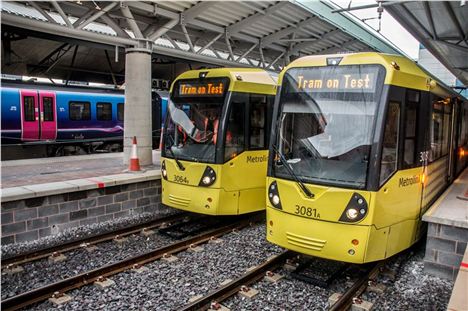SIR HOWARD Bernstein, Chief Executive of Manchester City Council, and Mayor of London, Boris Johnson, have thrown their weight behind a new report which calls for the devolution of transport powers to promote jobs and growth.
“Just 5% of taxes raised in Britain are controlled by UK cities, compared to 30% in Germany and 37.5% in the USA."
The new report, commissioned by Transport for London (TfL) and Transport for Greater Manchester (TfGM), and produced by leading economic consultants Volterra, argues that key cities such as London and Manchester should be given more financial independence and thus greater responsibility for the planning and building of new transport infrastructure.
Currently, major transport projects need approval of expenditure by the government. The report recommends these powers are devolved to local authorities to deliver maximum return to their economies.
It also states: 'Britain’s cities are among the least devolved in the world, with very little control over services, funding, or borrowing, constraining their ability to give a clear focus across policies at the local level to promote sources of competitive advantage in the interests of local and national productivity.'
 Sir Howard Bernstein - wants greater control over transport projects for Manchester
Sir Howard Bernstein - wants greater control over transport projects for Manchester
The Mayor of London, Boris Johnson, said: “Greater financial freedoms for our cities are absolutely central to their ability to better plan and finance the infrastructure they need to flourish. Transport is no exception to this argument. It is a vital key to unlock the door to wider growth in our economy, helping to spur jobs, new homes and regeneration.
"Working in partnership with other major cities I have been making the case for Whitehall to give us a greater say over our own futures and in turn boost the prosperity of UK plc.”
Sir Howard Bernstein, Manchester City Council Chief Executive, said: “As this report makes clear, greater devolution of transport powers is vital so that cities can better develop, fund and deliver transport improvements and fulfil their full economic potential.
“At present, the Government has a centralised system of funding with little integration at the city level. Just five per cent of taxes raised in Britain are controlled by UK cities, compared to 30 per cent in Germany and 37.5 per cent in the USA. The report states this should change.
“Changing the rules and providing cities with more economic freedom would allow new projects to get off the ground and deliver benefits far more quickly than is currently the case.
“The pipeline of infrastructure projects that could be created would then fill the order books of companies up and down the country providing more certainty over transport investment and more firms investing more in jobs, skills, apprentices and innovation for the long-run, something which existing short-term planning horizons work against.”
Other city and transport leaders from Birmingham, Leeds and Sheffield, including London’s Transport Commissioner Sir Peter Hendy and West Midlands Transport Chief, Geoff Inskip, have also rallied behind the new report.
The report states that transport investment in cities is crucial to a country's success ('transport builds density in cities which leads to economic growth'), and that the current approach towards transport projects could lead to 'damaging underinvestment'.
A shift of power from Whitehall to local authorities, the reports states, would 'pay back in terms of economic growth and jobs'.
The report calls for:
- fiscal devolution so that cities can keep and re-invest a greater proportion of the tax revenue generated by investment.
- a longer-term approach to funding that works across political cycles.
- a system which places greater weight on the economic pay back of transport investment.
- additional powers over transport services so that they can be planned and delivered for maximum economic return.
The report comes after Chancellor George Osborne recently confirmed a new transport deal for Manchester, including a £350 million Metrolink extension through Trafford Park (see here) and the wider roll-out of an Oyster-style travelcard system linking Greater Manchester's trams, buses and trains.
The report, 'Investing in City Regions: the case for long-term investment in transport', can be read in more detail here.











